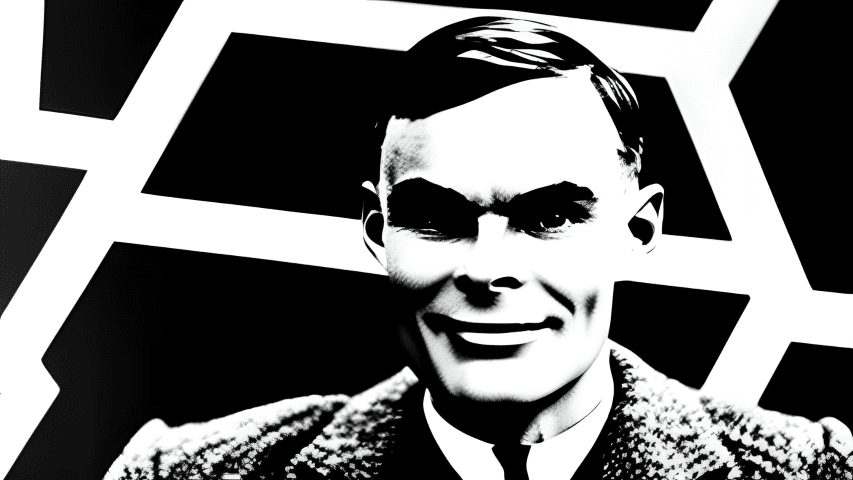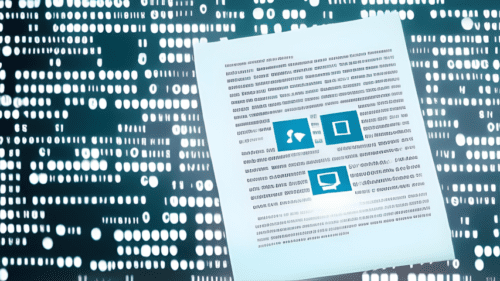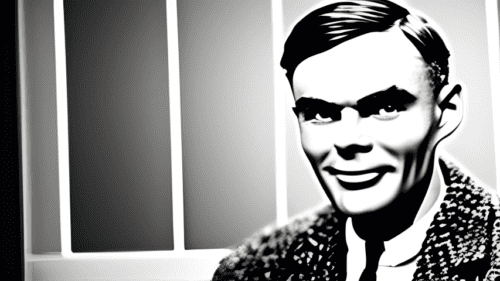Exploring the Legacy of Alan Turing: The Father of Artificial Intelligence
In the realm of technological advancements, the name Alan Turing shines brilliantly as a guiding star, illuminating the path to the development of artificial intelligence (AI). Often referred to as the “Father of Artificial Intelligence,” Turing’s profound contributions have laid the foundation for the evolution of this revolutionary field. In this article, we will delve into the life and work of Alan Turing, his pivotal role in shaping AI, and the enduring impact of his ideas.
Table of Contents 1. Introduction: The Genius Behind the Moniker 2. Early Life and Formative Years 3. Turing's Vision: Laying the Groundwork for AI 4. The Turing Test: Defining Intelligence 5. World War II and Codebreaking 6. The Birth of Modern Computing 7. Turing's Influential Paper: "Computing Machinery and Intelligence" 8. Turing's Legacy and Impact on AI 9. Contemporary Applications of Turing's Ideas 10. Ethical Considerations and Turing's Legacy 11. Beyond Machines: Turing's Contributions to Biology 12. Recognitions and Honors: A Posthumous Triumph 13. Turing's Imprint on Popular Culture 14. The Turing Award: Celebrating Excellence in Computing 15. Conclusion: A Visionary Whose Legacy Endures
Introduction: The Genius Behind the Moniker | Father of Artificial Intelligence
Alan Mathison Turing, born on June 23, 1912, in Maida Vale, London, was a mathematician, logician, and computer scientist. His pioneering work in various domains, including mathematics and cryptography, earned him the honor of being widely regarded as one of the greatest minds of the 20th century. However, it is his profound influence on artificial intelligence that has immortalized his legacy.
Early Life and Formative Years of father of artificial intelligence
Turing’s exceptional intellect was evident from an early age. He demonstrated a keen interest in mathematics and developed a passion for solving complex problems. After attending the Sherborne School and later, the University of Cambridge, Turing’s brilliance became increasingly apparent.
Turing’s Vision: Laying the Groundwork for AI
Turing’s groundbreaking paper, “On Computable Numbers,” published in 1936, introduced the concept of a theoretical computing machine, now famously known as the “Turing machine.” This theoretical construct became a fundamental building block for modern computers and was a significant step toward the eventual development of AI.
The Turing Test: Defining Intelligence
In 1950, Turing introduced the concept of the “imitation game,” which later came to be known as the Turing Test. This test aimed to determine a machine’s ability to exhibit intelligent behavior indistinguishable from that of a human. This idea sparked extensive debates and laid the groundwork for evaluating the capabilities of AI systems.
World War II and Codebreaking
Turing’s invaluable contributions during World War II were instrumental in breaking the German Enigma code, a feat that significantly influenced the outcome of the war. His work at Bletchley Park not only demonstrated his exceptional problem-solving skills but also highlighted the potential of machines to aid human endeavors.
The Birth of Modern Computing
Turing’s design for the Automatic Computing Engine (ACE) marked a critical advancement in computer architecture. Although ACE was never fully realized during Turing’s lifetime, his concepts paved the way for the development of modern computers, accelerating the journey toward AI.
Turing’s Influential Paper: “Computing Machinery and Intelligence”
In his seminal paper published in 1950, Turing posed the question, “Can machines think?” He explored philosophical and practical aspects of AI, discussing topics such as learning, reasoning, and creativity. This paper ignited discussions that continue to shape the field today.
Turing’s Legacy and Impact on AI
Turing’s visionary ideas laid the groundwork for AI research and development. His pioneering concepts inspired generations of scientists and engineers to push the boundaries of what machines could achieve. Today, AI systems, such as natural language processing and machine learning, owe much of their existence to Turing’s trailblazing contributions.
Contemporary Applications of Turing’s Ideas
The impact of Turing’s work reverberates through various industries. From healthcare and finance to transportation and entertainment, AI-driven technologies are transforming the way we live and work. Speech recognition, image analysis, and autonomous systems are just a few examples of how Turing’s ideas have found practical applications.
Ethical Considerations and Turing’s Legacy
Turing’s legacy also raises important ethical questions. As AI technologies become more sophisticated, concerns about privacy, bias, and the potential displacement of human labor have come to the forefront. Turing’s foresight encourages us to address these challenges responsibly.
Beyond Machines: Turing’s Contributions to Biology
Turing’s interests extended beyond computing. He made significant contributions to the field of morphogenesis, exploring the mechanisms that guide the development of biological forms. His pioneering work in this area showcases his interdisciplinary approach and his ability to cross traditional boundaries.
Recognitions and Honors: A Posthumous Triumph
Despite his immense contributions, Turing faced adversity due to his homosexuality, which was criminalized at the time. Tragically, he died by suicide in 1954. It was only in recent years that his contributions received the recognition they deserved, with posthumous apologies and honors, including the “Alan Turing Law” in the UK.
Turing’s Imprint on Popular Culture
Alan Turing’s life and work have inspired numerous books, movies, and documentaries. His legacy has become a source of fascination for storytellers who seek to explore the intersection of genius, technology, and humanity.
The Turing Award: Celebrating Excellence in Computing
In homage to Alan Turing’s enduring influence, the Association for Computing Machinery (ACM) established the Turing Award in 1966. This prestigious award recognizes individuals who have made significant contributions to the field of computing. It stands as a testament to Turing’s lasting impact.
Conclusion: A Visionary Whose Legacy Endures
Alan Turing’s legacy as the “Father of Artificial Intelligence” is a testament to human curiosity, ingenuity, and the relentless pursuit of knowledge. His visionary ideas and groundbreaking contributions have transformed the way we interact with machines, ushering in an era where AI is an integral part of our lives.
FAQs (Frequently Asked Questions)
- What is Alan Turing known for? Alan Turing is renowned for his pioneering work in the fields of computer science, mathematics, and artificial intelligence. He is often referred to as the “Father of Artificial Intelligence” due to his foundational contributions.
- What is the Turing Test? The Turing Test, introduced by Alan Turing in 1950, is a measure of a machine’s ability to exhibit intelligent behavior indistinguishable from that of a human. It assesses a machine’s capacity for natural language understanding and interaction.
- What is the significance of the Turing Award? The Turing Award is a prestigious honor in the field of computing, awarded by the Association for Computing Machinery (ACM). It recognizes individuals who have made outstanding contributions to the advancement of computer science.
- How did Alan Turing impact World War II? Turing played a crucial role in breaking the German Enigma code, a feat that greatly aided the Allied forces during World War II.
Read more


